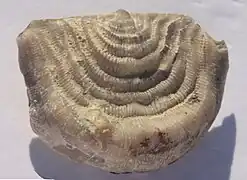| Leptaena Temporal range: | |
|---|---|
 | |
| Leptaena rhomboidalis | |
| Scientific classification | |
| Domain: | Eukaryota |
| Kingdom: | Animalia |
| Phylum: | Brachiopoda |
| Class: | †Strophomenata |
| Order: | †Strophomenida |
| Family: | †Rafinesquinidae |
| Subfamily: | †Leptaeninae |
| Genus: | †Leptaena Dalman, 1828 |
| Type species | |
| Leptaena rugosa Dalman, 1828 | |
| Species | |
|
See Species | |
| Synonyms | |
| |
Leptaena is an extinct genus of mid-sized brachiopod that existed from the Dariwilian epoch to the Emsian epoch,[1][2] though some specimens have been found in strata as late in age as the Tournasian epoch.[1][3] Like some other Strophomenids, Lepteana were epifaunal, meaning they lived on top of the seafloor, not buried within it, and were suspension feeders.[4]
Physical description
Leptaena usually have concentric wrinkling and concentric lines on the shell. Leptaena have a concavo-convex profile, and are sometimes Semiquadrate to semielliptical. The Cardinal Process is split in two and the hinge line is straight.[4] Their width is usually greater than their length, like most Strophomenids.
Distribution
Leptaena fossils have been found on every continent except Antarctica.[3][5][6]
Species
Leptaena was a diverse genus, with over 70 recognized species and subgenera. Species in the genus Leptaena include the following.[3][6][7] Any synonymous genera to which a given species may belong to are labelled with the synonymous genus in parentheses.
- L. acuta (Kurnamena) (Roomusoks, 2004)
- L. acuticuspidata Amsden, 1958
- L. aequalis Amsden, 1974
- L. alliku (Oraspold, 1956)
- L. altera Rybnikova, 1966
- L. amelia (Havlicek, 1967)
- L. analogaeformis Biernat, 1966
- L. arberae Kelly, 1967
- L. argentina (Thomas, 1905)
- L. bergstroemi Cocks, 2005
- L. borghiana Mergl & Massa, 1992
- L. boyaca Caster, 1939
- L. contermina Cocks, 1968
- L. convexa Weller, 1914
- L. cooperi Easton et al., 1958
- L. crassorugata (Similoleptaena) (Rõõmusoks, 2004)
- L. croma (Havlicek & Storch, 1990)
- L.crypta Opik, 1930
- L. cryptoides (Oraspold, 1956)
- L. dejecta (Baarli, 1995)
- L. delicata Amsden, 1949
- L. depressa (Sowerby, 1825)
- L. diademata (Williams, 1962)
- L. electra (Havlicek, 1967)
- L. ennessbe Spjeldnaes, 1957
- L. enucleata Klenina, 1984
- L. friedrichi (Similoleptaena) (Rõõmusoks, 2004)
- L. gibbosa (James, 1874)
- L. haverfordensis Bancroft, 1949
- L. holcrofti Bassett, 1974
- L. indigena Spjeldnaes, 1957
- L. infrunita (Williams, 1962)
- L. ingrica (Similoleptaena) (Rõõmusoks, 2004)
- L. juvenilis (Öpik, 1930)
- L. kentuckiana Pope, 1982
- L. lappa (Havlicek & Storch, 1990)
- L. lappina (Havlicek & Storch, 1990)
- L. laterorugata (Kurnamena) (Roomusoks, 1989)
- L. lemniscata (Havlicek, 1967)
- L. limbifera (Havlicek, 1967)
- L. martinensis Cocks, 1968
- L. moniquensis Foerste, 1924
- L. nanaformis Zhang et al., 1983
- L. nassichuki Smith, 1980
- L. odeon Havlicek, 1967
- L. oklahomensis Amsden, 1951
- L. ordovicica (Cooper, 1956)
- L. orhor (Havlicek & Storch, 1990)
- L. palmrei (Kurnamena) (Roomusoks, 2004)
- L. parvirugata Hoel, 2005
- L. parvissima Ivanovskii & Kulkov, 1974
- L. paucirugata (Roomusoks 1989)
- L. pertenuis (Similoleptaena) (Rõõmusoks, 2004)
- L. planitia (Similoleptaena) (Rõõmusoks, 2004)
- L. poulseni Kelly, 1967
- L. praequalis Rozman, 1977
- L. provellerosa (Havlicek & Storch, 1990)
- L. purpurea Cocks, 1968
- L. quadrata Bancroft, 1949
- L. quadrilatera (Logan, 1863)
- L. rara (Alekseeva and Erlanger, 1983)
- L. reedi Cocks, 1968
- L. rhomboidalis (Wahlanberg, 1818)
- L. richmondensis Foerste, 1909
- L. roomusoki Cocks, 2005
- L. rugata (Lindström, 1861)
- L. rugaurita (Havlicek, 1967)
- L. rugosa (Dalman, 1828)
- L. rugosides Oraspold, 1956
- L. salopiensis (Williams, 1963)
- L. semiradiata Sowerby, 1842
- L. senecta Roomusoks, 2004
- L. sperion Bassett, 1977
- L. spumiferra (Kurnamea) (Opik, 1930)
- L. strandi (Spjeldnaes, 1957)
- L. tarwanpensis (Similoleptaena) (Rõõmusoks, 2004)
- L. taxilla (Kurnamena) (Oraspold, 1965)
- L. tenuissimestriata McCoy, 1852
- L. tenuistrata Sowerby, 1839
- L. tenuistriata (de Sowerby and Murchison, 1839)
- L. trifidium (Leptaenopoma) (Marek and Havlíček, 1967)
- L. trifidum (Marek and Havlíček, 1967)
- L. undosa (Similoleptaena) (Rõõmusoks, 2004)
- L. valentia (Cocks, 1968)
- L. valida Bancroft, 1949
- L. veldrensis Spjeldnaes, 1957
- L. vellerosa Havlicek, 1967
- L. ventricosa Williams, 1963
- L. zeta Lamont, 1947
- L. ziegleri Cocks, 1968
References
- 1 2 Plaza-Torres, Stephanie; Darroch, Simon; Wagner, Peter. "Family tree of a mass extinction survivor: Phylogenetic analysis of the brachiopod genus Leptaena" (PDF). Smithsonian. Retrieved 31 March 2020.
- ↑ Hoel, Ole (21 January 2014). "Palaeobiology of Silurian Leptaeninae (Brachiopoda) from Gotland, Sweden". Paleontology Journal. 2014: 1–14. doi:10.1155/2014/716053.
- 1 2 3 Paleobiology Database
- 1 2 Stigall, Alycia (3 December 2013). "Leptaena". Atlas of Ordovician Life. National Science Foundation. Retrieved 26 March 2020.
- ↑ Global Biodiversity Information Facility
- 1 2 Fossilworks
- ↑ Catalog of Life